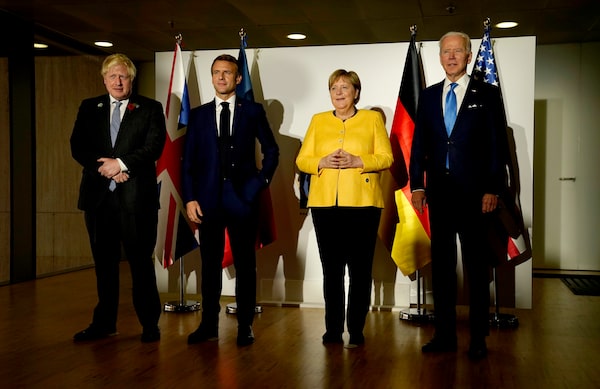
U.S. President Joe Biden, from right, then-German Chancellor Angela Merkel, French President Emmanuel Macron and British Prime Minister Boris Johnson pose prior to a meeting on the sidelines of the G20 summit in Rome on Oct. 30, 2021.Evan Vucci/The Associated Press
A year ago this week, freshly inaugurated U.S. President Joe Biden set out to make his first phone call to a fellow world leader. As a symbol of his promise to return his country to international co-operation and restore the bridges burned by his predecessor, he chose to start with the most powerful woman in the world, the German chancellor.
He failed.
Angela Merkel reportedly declined to take the call that Friday last January, officially because she preferred to spend the weekend at her modest vacation home outside Berlin. But she understood the symbolism at least as well as he did, and had spent two months listening to the president-elect’s plans and weighing the merits of a special relationship. By putting him on hold until he’d spoken to other leaders, she chose not to make it too special.
That quiet snub might have been written off as the eccentricity of one long-serving head of government in her final months. But that gesture became a pattern. Mr. Biden and his cabinet spent the year touring capitals and trying to build a consensus among democracies around the major threats and challenges they shared. And the White House found that not many were fully willing to join hands – in part because they didn’t buy Mr. Biden’s approach to authoritarian states, but also, as senior figures in Berlin and Paris told me, because they weren’t ready to bet the farm on the United States. Not when its own democracy appears fragile and tottering, and Mr. Biden may not last beyond 2024. Better to keep irons in other fires.
That became stunningly apparent on Wednesday. As negotiations with Moscow over its potential second invasion of Ukraine reached a peak, Mr. Biden gave a press conference in which he pledged that any major military incursion would result in devastating economic and monetary isolation of Russia – the sort of sanctions and banking cutoffs that could only happen with the co-operation of most major economies. The White House assured everyone it had criss-crossed Europe to build solidarity around the U.S. position.
Almost simultaneously, however, French President Emmanuel Macron addressed the European Parliament with a speech that rejected Mr. Biden’s approach, and urged the other 26 European countries to establish a “dialogue” with Russia different from the one in which they were engaged as NATO members: “It is good that Europeans and the United States co-ordinate, but it is necessary that Europeans conduct their own dialogue.” It was described as a “public dissent” that risked “undermining Western solidarity” just when a show of solidarity was needed.
On one level, these snubs reflect genuine and pre-existing differences between the U.S. and other democracies in their approach to authoritarian threats. French presidents have always been prone to breaking from NATO consensus and proposing a separate European approach, often motivated by anti-American sentiment. German chancellors have long preferred a conciliatory approach to Moscow and Beijing, and have shied away from threats; the current one, Olaf Scholz, still doesn’t have a clear stand on Russia’s threat to European democracy.
And the Americans shouldn’t be negotiating the fate of Ukraine – it’s a European country facing a threat to its place in Europe. Washington is only involved because Russian President Vladimir Putin wants to be seen possessing Cold War-scale importance, and Mr. Biden gave in to this conceit.
Nevertheless, it is a fallacy for democratic countries to avoid co-operation with the U.S., at this dangerous point in history, because they fear Mr. Biden’s democratic moment may be short-lived and want to hedge their bets against a future anti-democratic America.
First, this lack of solidarity is itself a serious threat to democracy. The authoritarian states, despite their schisms and differences, have managed to create a consistent and well-marketed image, based on xenophobic fears and ancient conspiracy theories and promises of muscular security. By publicly cold-shouldering the U.S. during its moment of democratic revival, we’re damaging the democratic brand among those susceptible to authoritarian temptations.
Second, the threat to democracy within the U.S. is nowhere near as great as the threat to democracy coming from this authoritarian bloc. Republicans may have engineered a set of voting-rule changes and congressional traps that could give them the presidency in 2024, and that could indeed trigger a de-facto civil war. But a growing majority of Americans are liberal Democrats, and the U.S. population becomes more democratic-minded, more progressive and plural, every year.
Mr. Biden is a truly representative leader. To turn our backs on him now, because he seems to be a flash in the pan or a flaky negotiator or excessively hawkish, is to give an enormous gift to the world’s most significant forces of authoritarianism.
Keep your Opinions sharp and informed. Get the Opinion newsletter. Sign up today.
 Doug Saunders
Doug Saunders